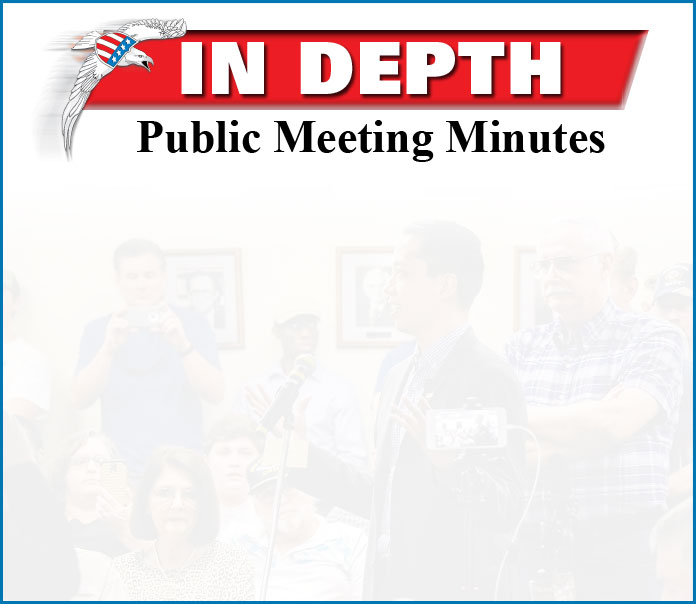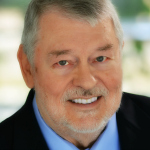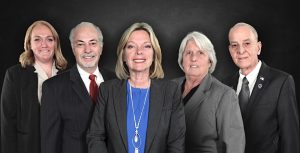Topic: Providing city insurance coverage for city officials to sue anyone who defamed them —
A new feature of The Citizen, available only online: The following are transcribed discussions by the City Council of Peachtree City, city staff and various citizens at the public meetings. We will publish these excerpts of the official minutes from time to time.
[The City Council of Peachtree City met in regular session on Thursday, April 18, 2019. Participating were Mayor Vanessa Fleisch, council members Terry Ernst, Mike King, Kevin Madden, and Phil Prebor, City Manager Jon Rorie, city staff and members of the public. The following are city-transcribed discussions of that meeting topic, taken directly from the official minutes of that meeting. For our coverage of that issue, click here, and here, and here.]
04-19-05 Consider Revised Indemnification Resolution – Defamation Suits
City Clerk Betsy Tyler explained this was a revision to the annual indemnification resolution that would provide legal expense coverage to an elected or appointed official, a volunteer, or City employee who had been defamed in a public media outlet so as to present a valid claim for defamation under Georgia law. Legal counsel would be selected by the person bringing the suit and would be reimbursed by the City at a rate not to exceed the approved hourly rate of the City Attorney, plus 20%. The City would have the right to seek reimbursement for the legal costs if the suit was successful.
Meeker then provided the definition of “libel” as the false and malicious defamation of another, expressed in writing, intended to injure the reputation of the person and exposing that person to public hatred, contempt, or ridicule. He said actual malice had to be proven in a case of libel brought by public figures, which Meeker noted included all seven people sitting on the dais. Non-public figures could sue on the basis of hatred, ill-will, or charges to injure, which were lesser standards than when free speech rights were at issue and could apply to media. Constitutional free speech/public figures had a higher standard. It required knowledge of falsity or reckless disregard of whether a statement was false.
Meeker continued that slander or oral defamation occurred when a false and malicious statement was uttered to a third party. These would be statements that were so of fensive that malice was implied, even if not shown. Examples included imputing to a person a crime punishable by law or making charges against another in reference to that person’s trade, office, or profession that was likely to injure that person in his or her business.
Georgia law generally treated libel more seriously than slander because libel involved a deliberate act of expressing defamation in writing. The theory behind that, Meeker noted, was that if it was in writing, it was more permanent.
Tyler then presented examples of statements that might or might not be considered defamatory. She noted that saying, “Mayor Smith was the worst Mayor we’ve ever had” was not defamation; it was opinion. Someone could say, “Council was wrong/blind/stupid to approve variance x or ordinance x” as an opinion. However, it might be defamation to say, “Planning Commission Member X was paid for a vote” or “Employee X was paid to issue a permit.” That would be accepting a bribe, which was an illegal act. If there was proof the official or employee did this, then it was not defamation. However, if the person making the statement knew it to be false or did not care if it was false, then it could be considered defamation because false accusations of a crime was not protected speech.
The Mayor asked about Planning Commission members, and Tyler told her they were volunteers from the community. Meeker said that hypothetical Planning Commission member could be considered a public figure and rise to the higher standard of proof of defamation under Georgia law. He said Police Chief Janet Moon and Fire Chief Joe O’Conor would be public figures, but it was questionable if the Fire Marshal was. The person who cut grass at the Peachtree City Athletic Complex (PAC) was not.
Fleisch said she wanted to pose a hypothetical situation and recalled that it was hard to get volunteer firefighters. In 2013, O’Conor related, volunteers put in 26,068 hours; last year, that number shrunk to 7,386. He said people had more family obligations now, and the ability to volunteer and meet training requirements had lessened.
The Mayor went on to describe a hypothetical situation in which volunteer firefighters visited a senior citizen’s home, at the request of the senior’s out-of-state daughter, to check a smoke alarm that was beeping. After the firefighters left, the homeowner noticed an item of value was missing and told her daughter, who jumped on Facebook to accuse the firefighters, by name, of stealing it. There was a lot of discussion, and the Police investigated the incident. Later, the item was found in the senior’s safe deposit box. Meanwhile, the volunteers had been publicly accused of theft. The Mayor asked how the indemnification policy would protect them. Meeker said they could pursue it on their own or they could ask the City to help with legal fees under the resolution that was proposed now.
Fleisch then noted the citizen Infrastructure Advisory Group, which had been comprised of five volunteers who spent months looking around the community to make recommendations of what should be on the SPLOST project list. One of the projects was a bridge. No definite location had been decided, but several neighborhood associations were upset. The City was even accused of class warfare. Members of the Advisory Group were accused of taking bribes. Meeker said the same principle would apply.
Meeker said the intent behind this resolution was to pay for legal action in cases such this, where people who were not public figures were defamed. He reiterated that the standard for defamation for public figures was much higher. This change would indemnify non-public figures for their legal costs if they sued.
Fleisch introduced Sean Youong of the American Civil Liberties Union (ACLU), who he had asked to speak. The Mayor again reiterated that the purpose of this policy change was to protect non-public figures. Youong said the motivations were not important; it was the effect. The effect of the resolution for them was that it could intimidate ordinary citizens from criticizing their government for fear of a lawsuit.
The Mayor then opened the floor for comments from the large crowd attending, reminding speakers that they would be granted two minutes each under Council rules for public comment.
Bobby Rouse of Americans for Prosperity thanked Council for having this discussion. His organization’s goal was to enhance civic discourse and defend free speech rights. He said they opposed the amendment because it required taxpayers to fund any defamation suit raised by any City employee, elected, or appointed official or volunteer. The First Amendment did not protect maliciously false speech against public figures, but the Supreme Court had set precedent. This resolution allowed public figures to threaten residents’ efforts to hold them accountable. It could cause citizens to hold back in public discourse for fear they would be the object of a taxpayer-funded lawsuit and the threat of a sizable attorney’s fee award against them. The Constitution protected free speech for all citizens, and exercising those rights was necessary for maintaining a dynamic society open to new and challenging ideas. He said this ordinance [sic] was unnecessary and could have a chilling impact on free speech. He asked Council not to enact it.
Olivia Cleveland, a 12-year-old student at J.C. Booth Middle School said she did not support the idea of suing people for hate speech with taxpayers’ money that could be used to build roads, hospitals, and schools. She said she knew people could go to the extreme to criticize Council’s actions, but by putting themselves in a public position, they opened themselves to those opinions and thoughts. Donald Trump was not using taxpayer money to sue people who hurt his feelings. Social media was a platform that gave people the courage to voice their opinions, which was their First Amendment right and should not be denied by local government.
Daniel Stuart also said public servants must not be allowed to use public funds to sue their critics. They had the right to sue as private citizens but no special indemnity should apply. He noted that Rorie was the only one who had spoken publicly about this action and had become a target for the community’s outrage. Stuart told Rorie to “Suck it up and listen. When you propose something outrageous, be prepared for outrage.” He stated those who could not take the criticism should grow a spine, and he would be happy to have them take him to court for saying that. He was certain he would win. He said he and others believed this was an attempt to silence criticism. Stuart called it an “Orwellian power grab” and urged Council to table this idea. It would cost the City precious funds that were needed for other projects.
David Richardson told Council he was dismayed and embarrassed to see his City ridiculed in the Atlanta media for doing something as ill-conceived as this. He was a public figure, a newspaper columnist, and stated he could have embarrassed the City leaders by writing a column, but would not do that as a neighbor. He noted that he believed passing this resolution would open the City up to even more lawsuits. Richardson advised them to abandon the idea and never reconsider it.
Jerry Crozier called the people who supported this “fools” and went on to say the First Amendment protected unpopular speech. If he said the way they spent tax dollars was criminal that was his opinion. Crozier told Council he would be first one to step up to be sued if they were stupid enough to do this. He told them they should be utterly embarrassed at having brought this up.
David Wilkerson introduced himself as a traditionalist, a Christian, and a combat veteran of Vietnam. He said he understood that if any public worker decided they were defamed, the City could use taxpayer money to sue. Any citizen who spoke up could be impoverished through the lawsuits. He called it “fascism.” First they take a person’s free speech, then a person’s weapons, then a person’s property, then a person’s life, he told the crowd. He said it started in small steps and mentioned Council’s previous discussion of going to a single provider for residential garbage service as an example. Wilkerson asked who originated the idea for this resolution originated.
Another citizen, who did not state his name, said he was there during the meeting about garbage privatization and stated that Rorie said he would sue citizens who alleged he was corrupt. This resolution seemed to be backing up that threat. He, too, urged Council not to follow through with this.
A Kedron resident stated this was a direct threat to the citizens and intimidation beyond comprehension. He said he once had an issue with the City and sent four emails without a reply. Then he was invited to meet with Rorie, and the situation was solved. The resident said he told Rorie this was a total display of incompetence, so he guessed Rorie wanted to sue him, too.
Bob Ross remarked that he expected government leaders to be moral, honest, and have a servant’s heart. They should always put the people first. After hearing a couple of hypotheticals, Ross noted that he still did not know how many volunteers they needed and how many they did not get due to the threat of disparaging comments on Facebook. He said this resolution did not meet the requirement to prioritize government over the governed. Most people could recognize unfounded criticism. He urged officials to look at the election results to see that most people did not pay attention to the criticism they read on Facebook.
Dennis Benson remarked that the television cameras in the room showed that this was a monumentally bad idea. He called the logic used to justify the resolution “bizarre,” saying he could not believe Council cared what was said about them on Facebook. He noted that this was not a hard decision to make, and said he trusted they did not elect a bunch of “snowflakes.”
Nick Ferrante read from the Declaration of Independence, commenting that passing this resolution would be the same as government without consent of the people.
Kenneth Martin commented that he grew up with defamation of character and should not have to pay for City officials to “protect their own butts” when something was said against them. He asked if they would do the same for him, if a City official said something against him. He said everyone had their own ideas and should be free to share them. The community should be moving forward.
The ACLU’s Young noted that it was rare, in this contentious political environment, to have people from the left and the right agreeing on one thing. The First Amendment protected the right to criticize public officials. Threatening constituents with lawsuits was undemocratic. This resolution did not just put taxpayers on the hook to pay the City’s cost; if a defamation lawsuit was brought and dismissed due to the First Amendment, there was something in Georgia called an “anti-slap statute” that required the plaintiff to pay the defendant’s legal fees. Taxpayers would not only be paying the City’s legal fees, they would be paying the fees of the defendant. After that. the constituent could sue for malicious abuse of process. If successful, taxpayers would pay that, as well.
Mike Greer said he had two concerns. One was that it could lead to frivolous lawsuits at taxpayer expense. Secondly, one of the founding precepts of American democracy was that citizens could speak out against government, and they were putting that to shame.
Tom Woolf noted that Rorie had been quoted in The Fayette Citizen as saying this was a brave new world. Woolf recalled that “Brave New World” was a cautionary dystopian novel about a world where the public did not speak up or engage in civic life. That was the world this type of resolution would create, Woolf commented. He said he had lived in Peachtree City for less than a year and had not had a lot of time to form an opinion of the local government. This was not a good first impression.
Steve Brown told the group he had been an elected official with both the City and Fayette County. He recalled that 20 years ago he wrote a letter to the editor describing corruption in government and, when the City Attorney threatened litigation, he wrote another letter to the editor describing what had happened. The attorney sued. Brown credited a local newspaper editor with publishing the letters and standing behind him. Without that, and the public support for him it encouraged, he would have been sued into oblivion. His legal fees amounted to about $10,000 and only stopped there because the attorney had to drop the lawsuit. Brown said he was on the verge of taking out a second mortgage to pay the legal fees. He reported that he was willing to bankrupt his family to point out the corruption in the City. The City Council backed the City Attorney at that time. Brown then said timing public comments at these meetings was horrible. Citizens should never have a stopwatch put on their input, he remarked. He told Council not to make the City look worse than it already did.
Nathan Watts felt the example Fleisch gave earlier about the firefighters was irrelevant. Bad things were spoken every day about people on Facebook and Twitter. He told Council they could behave like petulant children or be like most adults and move on. This was not thought out. If someone in California said something they did not like, he asked if Council send Peachtree City tax dollars to sue someone there. Watts asked about mysterious social media accounts and whether the City would pay a private investigator to find out who ran them. He said that he was fine with them using their own money to sue, but using the City’s money to sue as a politician interfered with the First Amendment. He told Rorie it was a brave new world; learn how to navigate it. Watts thought the country would grind to a halt if the President used tax dollars to sue everyone who called him corrupt. A City Manager felt he was more special than that. He told Rorie to “grow the F up” and said, no matter how Council voted at this point. they were going to lose. That this came up for consideration meant citizens should look into more of their actions.
Cleveland, age 12, spoke again to say all the people there cared about their community and wanted to do what was right.
A resident of Preston Circle remarked that this was undemocratic and far from the Constitution. He said it reminded him of Castro’s Cuba or Maduro’s Venezuela. Citizens needed to be allowed to state their opinions and that this was a democracy.
Tom Langley said this broke his heart. He had been looking all day on social media, and this had reached all across the state. A talk show host had called Council idiots for thinking this. He dared the City to sue him, saying he would bankrupt them.
Another resident told Council it was insulting to consider this. Taxpayer money should not be used for public officials to pursue petty Facebook arguments. He asked Council if they thought so little of their constituents that they thought this would pass.
Marianne Dias explained that she was a volunteer with the Peachtree City Police Department, and she would hate for anyone to say anything nasty about her because she tried to love everyone in town. She gestured to the dais and staff seating area and stated that she knew every one of those people and loved them all. Her take on the situation was that when you let people speak, you learned who they were — whether they were nice, kind, hateful, loving, or whatever.
She also wanted to remind everyone that they were all Peachtree City and not to say stupid things about people on Facebook or anywhere. She said Jesus said, “love as you love yourself,” which made a big difference.
Claudia Eisenberg related her ties to the community, but said she was totally embarrassed by this resolution’s proposal. Her question was whose idea it had been. Others from the crowd shouted out their questions about this, too.
Anne Latham said she came from a military family and raised her family in Peachtree City. She noted that comments on Facebook were just words, and Council could ignore them. They were words, not physical actions. This was silliness and was less than what this City was. Everything she was raised upon was being threatened by something as silly as this.
Garvin Edwards said he wanted to talk about free speech. He said he read in the paper that Rick Ross said anyone who would wear a Trump hat or a Trump shirt should be shot. He said he was offended by that, but was told to suck it up. That’s how he felt about this issue. Council should suck it up.
Martine Yancey said she was often a critic of the City. Over the last few months, she had seen an effort to shut down the voices of the citizens. If someone wanted to file an ethics violation against a City employee or official for violating the code of the City,Council threatened to stop people with a lawsuit and its cost if it was ruled unfounded. She said they were silencing citizens and alleged they were going against the law by limiting citizen comments on any issue to two minutes with a maximum of 10. That was a way of silencing citizens when they should be encouraging them to speak out. She urged Council to stop trying to silence citizens. She said the more they tried to silence her, the more she would fight back. They had to learn to work together as a community and listen to each other. She told them she prayed they would not go through with this.
Jesse Crozier asked who came up with the idea for this resolution to speak up. The crowd urged him to wait for an answer. He asked Meeker, Rorie, King, Fleisch, and Ernst, if they did and got “no” for answers.
Watts, physically unable to speak, returned to the microphone with several people to read his additional comments. He noted that he had cancer and had no wages that could be garnished. He said he was willing to post anything anyone wanted posted because he had nothing to lose in a lawsuit. Elliott said he was calling Rorie out publicly as being corrupt.
A woman who did not state her name said she was embarrassed. The voters had put those people up on the podium and now they were giving the people a spanking because they did not go along with everything they wanted. She said her daughter was in media and was constantly criticized, but she went on with her life. The citizens would have to hire their own lawyer and spend their own time to defend themselves in a defamation suit. She shouted that she was tired of this, tired of how the country was going, and now it had trickled down to their own hometown. She was tired of being told what she could and could not say. She would continue to say what she wanted, and, if Council didn’t like what was on social media, they should turn it off.
She worked in the schools and when kids were hurting because someone slammed them on social media, their parents told them to turn it off. She wondered why Council and City officials were on social media at all. She commended Moon for not responding to all the social media criticism the Police Department received. The Fire Department was the same. She told Council this should be a lesson for them: next time there was an election, do not run. She did not care who started this, they were all guilty. She urged Council members and staff to resign if they could not handle criticism.
Mcintosh High student Jack Bragg told Council he felt that this being on the agenda made them all guilty of wanting to silence the free speech of their own citizens. There were numerous things on Twitter, and it made Peachtree City look horrible at a national level. It was despicable. He said they talked about libel law and the First Amendment in his AP Government class. He reminded them that they were all public servants and had chosen to represent the citizens. If they did not like the way people talked about them, do not run.
Another resident who did not state his name called it a “bonehead idea,” and said there had been a lot of bonehead ideas. He told them not to have any more bonehead ideas.
A resident gave a quote that he said was from Albert Einstein: “The main difference between genius and stupidity is that genius has its limits.”
Comments from the public were concluded.
King said he had been on the Council for six years and had now witnessed the second item that they had made a mistake to allow on the agenda. He continued that all seven people on the dais knew each other fairly well, and five of them had gotten into this business because they wanted to make Peachtree City better. He said some of the things this Mayor and Council had done, such as getting MacDuff Parkway extended at no cost to the City, Drake Field, the spillway, had been really good. Like the gentleman who talked about his service in Vietnam, there were other people on Council who had defended everyone’s First Amendment rights. King said he would do so again.
The intent behind the resolution had been to protect someone like a police sergeant, for instance, who gave some a ticket and that person went ballistic on social media and defamed him to the extent that he could not get another job in another city. King said he would put it on his dime if the police sergeant had to sue someone to recover his good name.
King understood the crowd was upset because Council was looking at using public money to protect City officials, but many of the ethics complaints filed were frivolous. He asked if those attending realized it costing their tax dollars to defend against frivolous suits, saying they needed to keep that in mind as well. King looked at truth as the total truth, and wanted to bring out al the facts. Council had learned a serious lesson. All five of them would, in the future, take a much bigger interest in agenda items before they hit the street.
He admitted that most of them did not see the proposed agenda until the Monday prior to the Council meeting. That could be fixed. He said he believed the circus had run its course and wanted to move that they deny this ordinance. The Mayor asked for a second.
Ernst asked if he could speak before the vote. He stated he had been a public servant for 47 years and had retired from the Army and from the Peachtree City Police Department after 20 years of service. Ernst said all a man or woman had was their integrity, and he did not care for his integrity to be challenged. Ernst said he had done nothing but give his career for this City and would continue to do so. Council made a mistake; maybe they had not understood it fully, but the crowd was loud and clear. They would move on and learn from their mistake. He said he wanted them to know he would never do anything to embarrass Peachtree City.
Prebor said he wanted to echo King and Ernst’s comments. He was against the resolution, but they all had to admit there was a problem as a society that needed work. He noted that serving on Council was essentially a volunteer job. His wife was ill, and it was not easy. Everybody with him on the dais was doing the best they could. Prebor said he agreed with King that they should have looked at this more closely before it came up on the agenda. He said he would take responsibility for it, also, and appreciated hearing from everybody.
Madden said they lived in a wonderful age when someone could reach millions of people with a few strokes of the keyboard. But this was also a terrible time when irresponsible imbeciles used the same power to harass, insult, and shame children with unfair and hurtful accusations. The country’s intelligence agencies had shown how enemies of democracy could use the country’s freedom of information to attack America by spreading false rumors and inflammatory rhetoric about the culture, society, leadership, and candidates for public office here.
Madden asked what should be done do to protect the children, nation, and even Peachtree City workers and officials from the cranks and enemies who would use freedom of speech against them. These were some of the most important questions of the time, Madden went on. Should they take vengeance against the enemies of democracy with cyberwarfare or even worse, he asked. Should they use expensive legal action or should they sacrifice their ideals of fair play and truth-telling on the altar of the internet, he asked.
He mused that Pandora’s box had already been opened, adding that on social media words like “empathy” and “honor” gave way to expressions like “hate speech, fake news, white supremacy, and Communists.” He sometimes wondered why anyone would put themselves up for public office, saying he had seen things on the internet that would make George Orwell blush.
Madden asked if justice would be served if they sued the liars, responding that he thought not. They could not legislate fairness and truth-telling, as both required character. Madden noted that, in the year he had served with this Council and the conscientious City Staff, he had observed the meaning of public service. Today, Peachtree City was a better and safer place because of their sacrifices and efforts for the public good. No amount of bullying and bad-mouthing could change that. He said he did not have the answers to all the questions he had posed,but discussing them was as good first step. However, he did not believe this resolution was the answer, either.
King moved to deny the amendment. Ernst seconded. Motion carried unanimously.
Prebor moved to convene in executive session for threatened or pending litigation at 9:30p.m. King seconded. Motion carried unanimously.
King moved to reconvene in regular session at 9:45 p.m. Ernst seconded. Motion carried unanimously.
King moved to enter into a Joint Defense Agreement with the Peachtree City Water and Sewerage Authority in the Dufresne case, as discussed in Executive Session. Prebor seconded. Motion carried unanimously.
There being no further business,Madden moved to adjourn the meeting. Ernst seconded. Motion carried unanimously. The meeting adjourned at 9:47 p.m.
Martha Barksdale, Recording Secretary. Vanessa Fleisch, Mayor.












Leave a Comment
You must be logged in to post a comment.